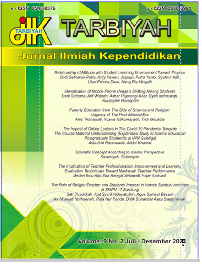The Role of Religion Teacher and Students' Interest in Islamic Spiritual Activites at SMPN 17 Bandung
DOI:
https://doi.org/10.18592/tarbiyah.v9i2.3698Abstract
Among the roles of religion teachers are directing students and animating religious extracurricular activities. What motivates the students to take part in Rohis (Kerohanian Islam) extracurricular activities is the students' interest in Islamic religious lessons, and the direction from the religion teacher. The purpose of this study, to examine the role of religion teachers and student interests. relation to spiritual activity. This study uses a descriptive quantitative approach with multiple variables. The respondents are active 8th grade students. Data collection through questionnaires, interviews, observation. Then the data was analyzed, then the correlation was calculated using SPSS 20 and then concluded. The find research religion teachers in guiding and motivating, as well as students' interest in learning religion is closely related to the spiritual activities.References
Abdulsyani. (2002). SosiologiSkematika, Teori, danTerapan. Sinar Grafika.
Ahmad Syamsu Rizal, A. Toto Suryana A. (2015). Kegiatan Ekstrakurikuler Keagamaan Di Sekolah Dalam Menunjang Tercapainya Tujuan Pembelajaran Pai (Studi Deskriptif Analisis di SMP Negeri 44 Bandung Tahun Ajaran 2014/2015). Tarbawy, 2 No 1(Pendidikan), 82.
Cholid Narkubo, A. A. (2013). Metode Penelitian. PT BumiAksara.
Djamarah, S. B. (2000). Guru dan Anak Didik dalam Interaksi Edukatif. Rineka Cipta.
Djamarah, S. B. (2011). Psikologi Belajar. PT. Reneka Cipta.
Febri Agung. (2017). Efektivitas Kegiatan Ekstrakurikuler Keagamaan (Rohis) Dalam Meningkatkan Hasil Belajar Siswa di SMP Wiyatama Bandar Lampung.
Hamka Abdul Aziz. (2012). Karakter Guru Profesional. Al Mawardi Prima.
Muhaimin. (2005). Studi Islam dalamRagamDimensidanPendekatan. Prenada.
Ngalimu, dkk. (2016). Strategi dan Model Pembelajaran,. Yogyakarta: AswajaPressindo.
Noer, H. M. A., Tambak, S., & Rahman, H. (2017). Upaya Ekstrakurikuler Kerohanian Islam (ROHIS) dalam Meningkatkan Sikap Keberagamaan Siswa di SMK Ibnu Taimiyah Pekanbaru. Jurnal Pendidikan Agama Islam Al-Thariqah. https://doi.org/10.25299/althariqah.2017.vol2(1).645
Poerwadarminta. (2007). Kamus Umum Bahasa Indonesia. Balai Pustaka.
Rizki Susanto dan Utien Kustianing. (2019). Pelaksanaan Ekstrakurikuler Pendidikan Agama Islam Di Sekolah: Studi di SMPN 3 Malang Tahun 201. JRTIE: Journal of Research and Thought of Islamic Education, 2(pendidikan), 77.
Rokib. (2018). Pengaruh Ekstrakurikuler Rohani Islam (Rohis) Terhadap Hasil Belajar PAI Pada Siswa Kelas X SMAN 5 Tangerang.
Soekanto, S. (1990). Sosiologi Suatu Pengantar, Edisi IV. In Jakarta, Penerbit Rajawali.
Sugiyono. (2017). Metode Penelitian Pendidikan Pendekatan Kauntitatif, Kualitatif, R&D. In Metode Penelitian Pendidikan Pendekatan Kuantitatif, Kualitatif Dan R&D.
SuharsimiArikunto. (2013). Produser Penelitian Suatu Pendekatan Praktik (Rineka Cipta (ed.)).
Syamsu Yusuf LN. (2004). No Title Psikologi Belajar Agama. Pustaka Banin Quraisyi.
Yudrik Zahya. (2013). Psikologi Perkembangan. Jakarta: Prenadamedia Group, 2013, hal.63.
Downloads
Published
How to Cite
Issue
Section
License
Authors retain copyright and grant the journal right of first publication with the work simultaneously licensed under a Creative Commons Attribution 4.0 International License that allows others to share the work with an acknowledgment of the work's authorship and initial publication in this journal.




